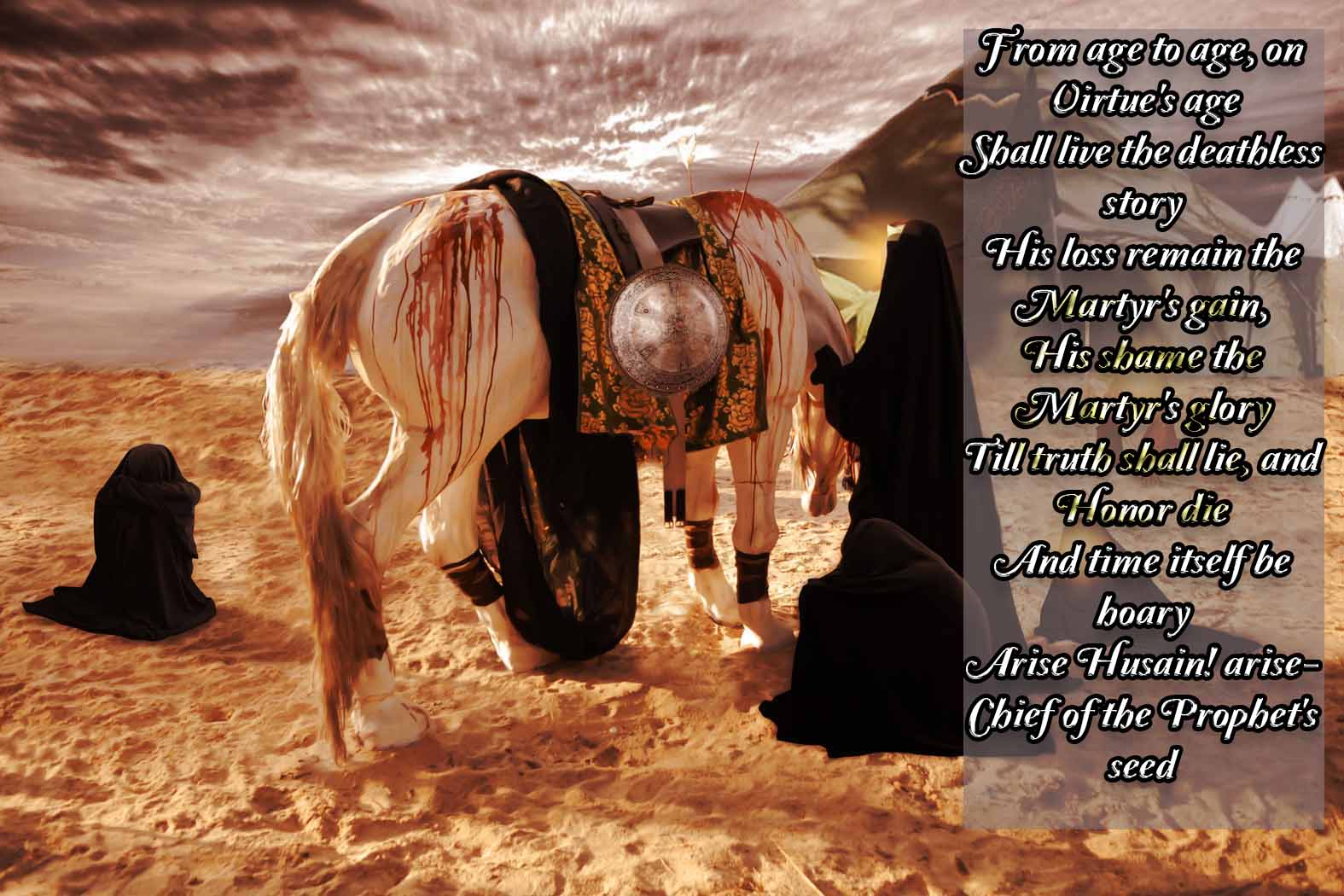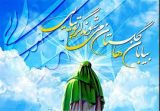موضوع: "ASHURA"

کل یوم عاشورا و کل ارض کربلا
چهارشنبه 96/05/11
بسم الله الرحمن الرحیم
مردم سوریه مانند کسانی بودند که برای آنها تبلیغات مسموم و چهره ای نادرست از امامان(علیهم السلام) ترسیم شده بود.
ولی مردم کوفه خطابه های امام علی(علیه السلام) را شنیده بودندو شناخت لازم از امام داشتند پس عذرشان در واقعه کربلا و حادثه عاشورا پذیرفتنی نبود.
زینب کبری در خطبه هایش مردم کوفه را به زنی کم عقل تشبیه کرد که زحمات فراوانی برای رشته کردن پشمها متحمّل می شود ودر پایان دوباره رشته ها را از هم وا می تابد که به این آیه قرآن کریم اشاره دارد.
in the name of God
The Syrians were like those for whom poisoned ads and a false face of the Imams (PBUH) were portrayed
However, the Kufa people heard the sermons of Imam Ali (as) and had the necessary knowledge of the Imam, so their excuse in the incident of Karbala and the incident of Ashura was not acceptable.
Zaynab Kobra, in his sermons, likened the people of Kufa to a woman of low wisdom, who was struggling to string the wool, and at the end of the reappearance of the strings, which refers to this verse of the Holy Qur’an
وَلَا تَکُونُوا کَالَّتِی نَقَضَتْ غَزْلَهَا مِنْ بَعْدِ قُوَّةٍ أَنْکَاثًا تَتَّخِذُونَ أَیْمَانَکُمْ دَخَلًا بَیْنَکُمْ أَنْ تَکُونَ أُمَّةٌ هِیَ أَرْبَىٰ مِنْ أُمَّةٍ ۚ إِنَّمَا یَبْلُوکُمُ اللَّهُ بِهِ ۚ وَلَیُبَیِّنَنَّ لَکُمْ یَوْمَ الْقِیَامَةِ مَا کُنْتُمْ فِیهِ تَخْتَلِفُونَ
و (در مثل) مانند زنی که رشته خود را پس از تابیدن محکم وا تابید نباشید، که عهد و قسمهای استوار و محکم خود را برای فریب یکدیگر و فسادکاری به کار برید برای آنکه قومی بر قوم دیگر تفوق دارند، زیرا خدا شما را به این عهد و قسمها میآزماید و در روز قیامت همه (تقلّبها و) اختلافات شما را بر شما آشکار خواهد ساخت
And do not be like she who untwisted her spun thread after it was strong [by] taking your oaths as deceit between you because one community is more plentiful than another community. Allah only tries you thereby. And He will surely make clear to you on the Day of Resurrection that over which you used to differ
و این همه نشانه بی وفایی و عدم استقامت کوفیان بود.
And all this was a sign of Kofi’s insolence and endurance
#جهاد_عاشورایی


بهترین وبلاگ ها

Ashura
سه شنبه 96/05/03
As the enemies had the body of Imam Hussain (as) surrounded, each took their turn stabbing his pure defenseless body, laid out on the ground; thus, while viciousness, revengefulness, and feral behavior swept through the battle field, in the camps of Imam Hussain (as) the spirit of remembrance in God, the human quality of tenderness, and intense emotions prevailed.
All women and children—no one but women and children were left in the camps, with the exception of the only surviving male Ali Ibn Hussain (as) who was ill—were worried about Hussain Ibn Ali (as) and what would transpire next.
They came out of their tents, and proceeded to the area where they believed Hussain Ibn Ali’s (as) body was seized; it has been narrated that the women departed from the camp. You have probably seen or heard how Arab women weep and mourn: it is still common among Arab women to mourn painfully upon the death of their loved ones; they beat their own faces, and pull at their hair; they mourn in such an intense manner. Well, these women had lost a loved one, a man like Hussain Ibn Ali (as).
Hazrat Zeinab was heading the women towards the sight of his martyrdom. When she arrived, she spotted the body of her beloved brother on the blistering grounds of Karbala. Instead of revealing some sort of reaction, or grievance, she went to the corpse of her beloved Hussain (as), and called on her grandfather (pbuh). She said, “O’ the Messenger of God, peace be upon you! Take a look at your Hussain who is covered in blood, with his body hacked up.” O’ my dear grandfather! O’ Great Prophet, look towards the hot desert of Karbala. This is your Hussain who is now covered in blood and dust.
Then, as it has been narrated, Zeinab (as) reached her hands beneath the body of Hussain Ibn Ali (as) and called out, “O’ God! Please accept this sacrifice from the progeny of Muhammad (saw)!”
Ayatollah Khamenei, 9/27/1985
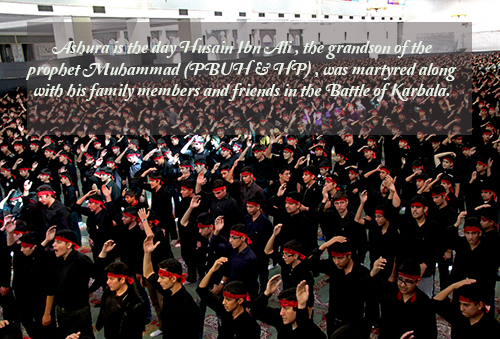
بهترین وبلاگ ها

ََAshura
سه شنبه 96/05/03
Of course this is easier said than done. What Imam Hussein (a.s.) did was an extraordinary feat. That is to say, the dimensions of his action are far more than what we estimate. We usually ignore aspects and details. Once I spoke about Imam Hussein’s (a.s.) patience. His patience was not limited to enduring thirst or seeing his companions being killed. These things are relatively easy to tolerate. The kind of patience that is difficult to practice is to listen to influential, aware and respectable people who keep creating doubts and telling you that what you are doing is dangerous and wrong. Who did those things? People like Abdullah Ja’far, Abdullah Zubair and Abdullah Abbas. These prominent figures of that time were constantly telling Imam Hussein (a.s.) not to do what he was doing. If it were somebody else, somebody who did not have that determination and stable character, he would have thought, “Well, I did my duty. These people are talking like this and the world is acting like that, so I should just say what I am supposed to say and do nothing else.” A person who decides to stand up against such statements, such temptations, such doubts and such efforts to bend sharia and is not dissuaded from continuing his path - such a person is the one who can give rise to such a great transformation. In this regard our magnanimous Imam (r.a.) was similar to the Lord of the Martyrs. I explained this in another meeting and I do not want to go into the details now. This was how Imam Hussein (a.s.) acted as a guardian.
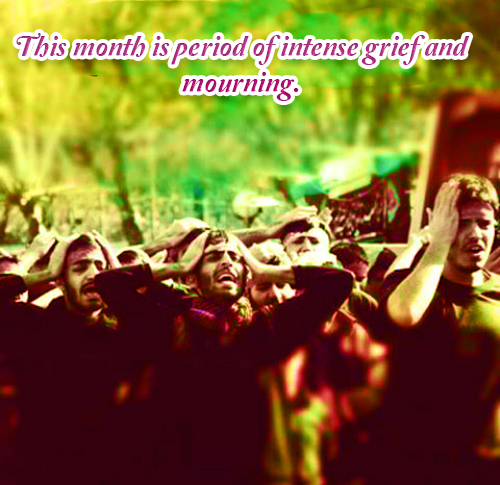
بهترین وبلاگ ها

ashura
یکشنبه 96/05/01
What is Muharra؟
Muharram (Arabic: محرم) It is the first month of the Islamic calendar. Instead of joyous celebration, Muslims mark the beginning of the New Year by taking up the black attire of sorrow and participate in mourning gatherings in which the sacrifices of Husain and his companions are commemorated. It is one of the four months of the year in which fighting is prohibited. Since the Islamic calendar is lunar, Muharram moves from year to year when compared with the Gregorian calendar.
Muharram is so called because it was unlawful to fight during this month; the word is derived from the word ‘haram’ meaning forbidden. It is held to be the most sacred of all the months, excluding Ramadan.It is the same month when Husayn, the grandson of the Prophet Muhammad, was brutally massacred in Karbala alongside his family and friends in the year 680 CE/61 AH.
محرم اولین ماه از تقویم اسلامی است. مسلمانان به جای مراسم شادی، سال جدید را با پوشیدن لباس سیاه که حاکی از غم و اندوه است آغاز می کنند و در مراسم عزاداری که در آن فداکاری امام حسین و یارانش یادآوری می شود، شرکت می کنند..این ماه یکی از چهار ماه حرام است که در آن جنگ حرام است.از آنجاییکه تقویم اسلامی قمری است، محرم در مقایسه با تقویم میلادی سال به سال در حرکت است.
محرم ماه شناخته شده ای است چون در این ماه جنگ و خونریزی حرام است. واژه محرم از کلمه “حرام” گرفته شده است که به معنای ممنوع می باشد .بعد از ماه رمضان ، محرم از مقدس ترین ماه هاست .محرم ماهی است که امام حسین نوه پیامبر اسلام حضرت محمد به همراه خانواده و دوستانش در سال شصت و یک هجری در کربلا ، بیرحمانه به شهادت رسیدند .
Their martyrdom is a sad day for all Muslims, especially the Shi’a, who hold mourning ceremonies to recall the righteous virtues for which the valiant martyrs stood and the grave calamities that they thus had to bear. The commemoration of this brutal massacre (Battle of Karbala) begins on the first day of Muharram and reaches its climax on the 10th of Muharram, the day of the battle, known as Ashurah and continues for 40 days or 69 days.
شهادت آنها روز غم انگیزی برای مسلمانان به ویژه شیعیان است که مراسم عزاداری یادآوری فداکاری و تقوای مردان شجاعی است که مقاومت کردند و مصائب بزرگی را تحمل کردند. بزرگداشت واقعه کربلا، از اول محرم شروع می شود و در روزدهم به اوج خود می رسد که “عاشورا” –روزی که جنگ رخ می دهد- نام دارد به اوج خود می رسد و سپس به مدت چهل یا شصت ونه روز ادامه پیدا می کند.
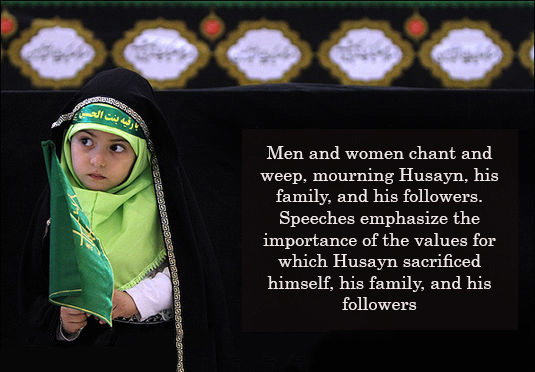
بهترین وبلاگ ها

Ashura
شنبه 96/04/31
The concept of guardianship was embodied by Imam Hussein (a.s.) with all its dimensions and with all the necessary and possib This is not to say that others did not do such a thing or did not want to do such a thing, rather it means that this movement was fully realized in the behavior of the Lord of the Martyrs (a.s.) during his ten-year imamate. One can clearly notice in his lifestyle all the methods that could have been used by a descendant of the Holy Prophet (s.w.a.) to preserve the great legacy of Islam which has been passed down by the Holy Prophet (s.w.a.) and his father as well as their genuine followers. We can clearly see everything in the lifestyle of the Lord of the Martyrs (a.s.) - everything ranging from clarification, to forewarning, to promotion of Islam, to provoking the conscience of prominent figures of his time during a sermon in Mina. All these things are tangible in the lifestyle of the Lord of the Martyrs (a.s.). Later on he stood up against a great deviation and laid down his life. Imam Hussein (a.s.) was aware of the consequences of his movement. He was an le means.infallible Imam. Infallible Imams’ extensive knowledge and insight are beyond our heads. Imam Hussein (a.s.) revolted to set a role model and he refused to surrender. He asked people to help him and when a group of people from Kufa expressed their willingness to accompany him on this path, Imam Hussein (a.s.) accepted their offer and moved towards Kufa and he did not give up in the middle of the way. Imam Hussein (a.s.) stood up against the deviated current of his time, which was extremely dangerous. And this became a lesson and Imam Hussein (a.s.) himself makes the same point. That is to say, he backed up his action with the order of Islam. He said that his duty was what he was doing. He said that he had to express his opposition, no matter what the consequences were. He said, “It is good if my destiny is a victory and if my destiny is martyrdom, so much the better.” This was how Imam Hussein (a.s.) acted.
This was a perfect instance of self-sacrifice and it safeguarded Islam. This move preserved Islam. This move institutionalized values in society. If Imam Hussein (a.s.) had not accepted this danger, if he had not made a move, if he had not taken action, if his blood had not been shed, if those great tragedies had not happened to the shrine of the Holy Prophet (s.w.a.), to Imam Ali’s (a.s.) daughter and to the Holy Prophet’s (s.w.a.) descendents, this event would not have gone down in history. The event that could have prevented that great deviation had to shock people and history as much as the deviation did. This shows Imam Hussein’s (a.s.) self-sacrifice.
Of course this is easier said than done. What Imam Hussein (a.s.) did was an extraordinary feat. That is to say, the dimensions of his action are far more than what we estimate. We usually ignore aspects and details. Once I spoke about Imam Hussein’s (a.s.) patience. His patience was not limited to enduring thirst or seeing his companions being killed. These things are relatively easy to tolerate. The kind of patience that is difficult to practice is to listen to influential, aware and respectable people who keep creating doubts and telling you that what you are doing is dangerous and wrong. Who did those things? People like Abdullah Ja’far, Abdullah Zubair and Abdullah Abbas. These prominent figures of that time were constantly telling Imam Hussein (a.s.) not to do what he was doing. If it were somebody else, somebody who did not have that determination and stable character, he would have thought, “Well, I did my duty. These people are talking like this and the world is acting like that, so I should just say what I am supposed to say and do nothing else.” A person who decides to stand up against such statements, such temptations, such doubts and such efforts to bend sharia and is not dissuaded from continuing his path - such a person is the one who can give rise to such a great transformation. In this regard our magnanimous Imam (r.a.) was similar to the Lord of the Martyrs. I explained this in another meeting and I do not want to go into the details now. This was how Imam Hussein (a.s.) acted as a guardian.
Statements made during an address to members of IRGC; July 4, 2011.
